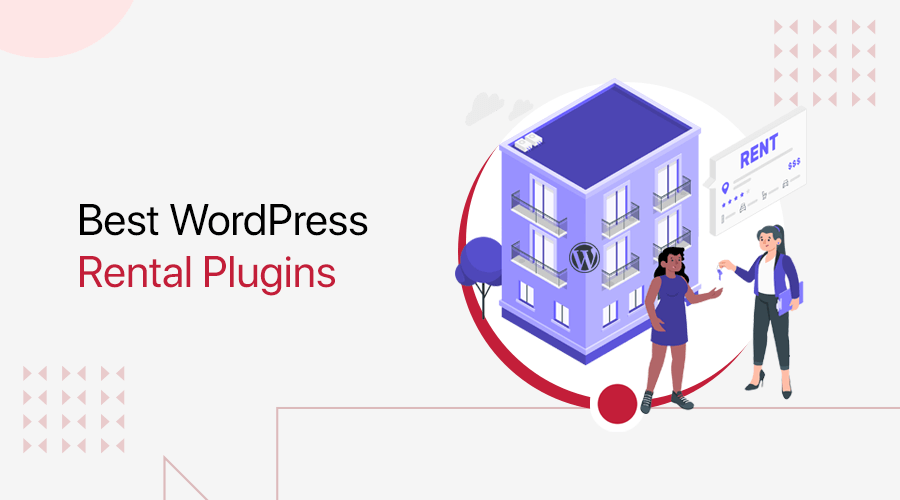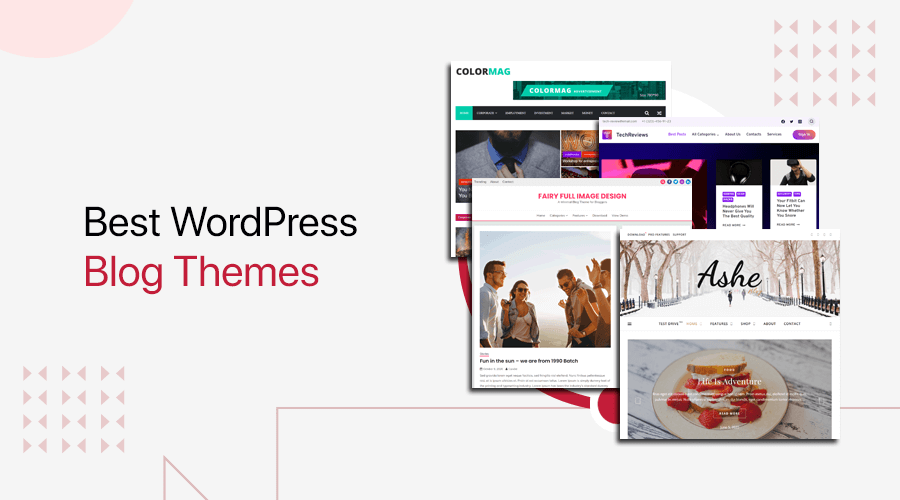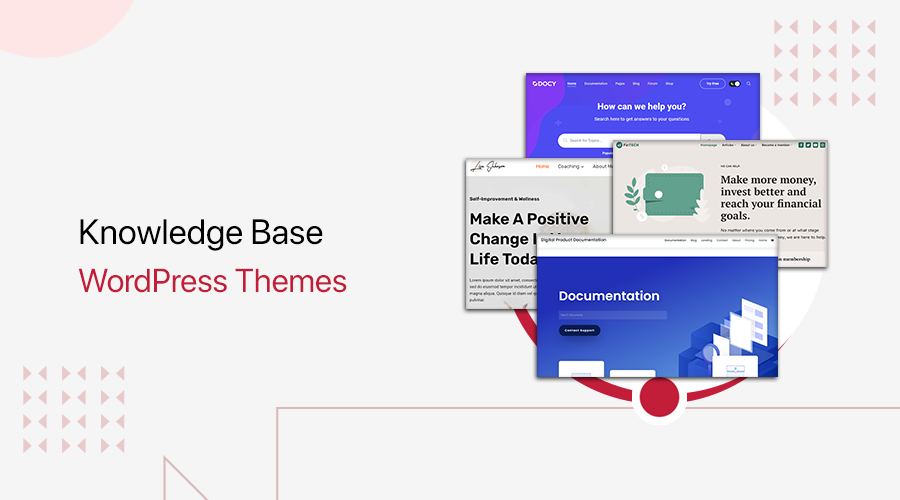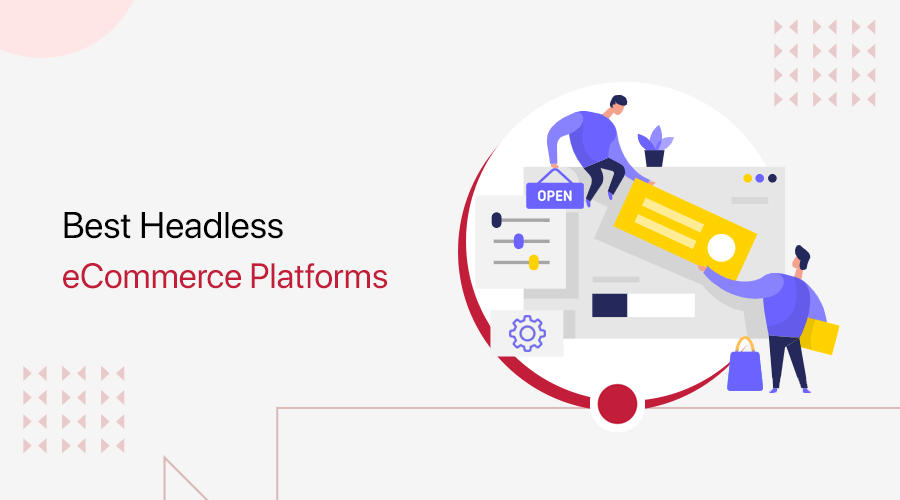
Are you looking for the best headless eCommerce platforms? Or do you want your online store to stand out in the market? If yes, then here we go!
Leading eCommerce sites like Amazon are introducing new technologies for their users. For small to medium shops to stand out in this tough competition, they must adopt these new technologies.
But how is that possible? It’s simple by using headless eCommerce! A headless eCommerce platform separates the front-end and back-end of your site. As a result, you’ll have more freedom to integrate whichever technology to build whatever you want.
To help you out, here are the best headless eCommerce platforms. Go through their features, pros, cons, and pricing to select a suitable solution and make your dreams come true. Now, let’s start!
What is Headless eCommerce?
Headless eCommerce is an architecture that separates the front end of eCommerce sites from their back end. With this separation, businesses get more flexibility in changing the front-end user experience. As it offers the freedom to build an online shop with endless possibilities.
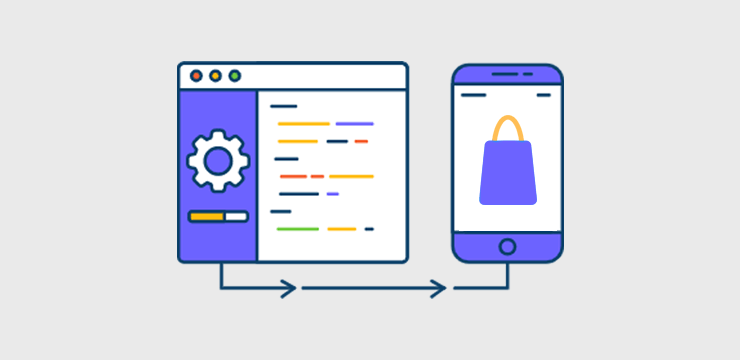
In other words, headless eCommerce is ‘an eCommerce that works well without a head’. Here, the front end is called the head. But how does a website function with its backend only? Let’s see!
With headless eCommerce, your eCommerce website will completely depend on the backend. And the content gets delivered on the front-end using APIs (Application Programming Interface) and frameworks. While the developers need to produce content like products, prices, etc.
It means you can select any of your preferred front-end frameworks or technologies for your online store. This isn’t possible with the traditional eCommerce approach. Because traditional platforms let you choose a template already built with its specific framework.
For example, you can use the latest technologies like ReactJS (a JavaScript library that builds single-page application user interfaces). Using it, when a visitor tries to access a different page on your site, then the pages won’t reload. But they can access the content they want on the front end.
Thus, this shows how headless eCommerce improves your site speed. Ultimately, it also enhances your site’s user experience. As a result, your online store will gain more sales and brand loyalty.
How to Choose the Best Headless eCommerce Platforms?
There are many platforms built with the headless eCommerce approach. So, before choosing from the best headless eCommerce platforms, go through these points of consideration:
- Omnichannel Experience: Headless eCommerce platforms allow you to sell your products on multiple channels like Facebook, Amazon, etc., without using plugins. So, the platform you select should allow you to sell on your preferred channels.
- Support Integrations: Such platforms allow you to add extra software for better shopping functionality. So, check if it seamlessly integrates your marketing automation tool, CRM (Customer Relationship Management), etc.
- Easy-to-Use: Make sure the platform is user-friendly for you and your visitors. It’s best to select a platform with a simple interface to work with.
- Customer Support: Headless eCommerce is technical, so check if your platform gives you good support or not. So, see if it offers tutorials and training for you.
- Pricing: Lastly, see if the pricing options of the platform are clear and affordable for you or not. Also, check the features of the plans that it offers to meet your needs.
With that, let’s move into our next section!
13 Best Headless eCommerce Platforms for 2022
Here are the top headless eCommerce platforms present in the market. Now, read the description, pros, cons, and pricing of all of them. That’ll let you select an ideal solution for your needs.
1. Shopify Plus
Shopify Plus is a scalable and fast headless eCommerce platform best for enterprises. It contains features like unlimited bandwidth and 99.9% uptime service for your growing business.
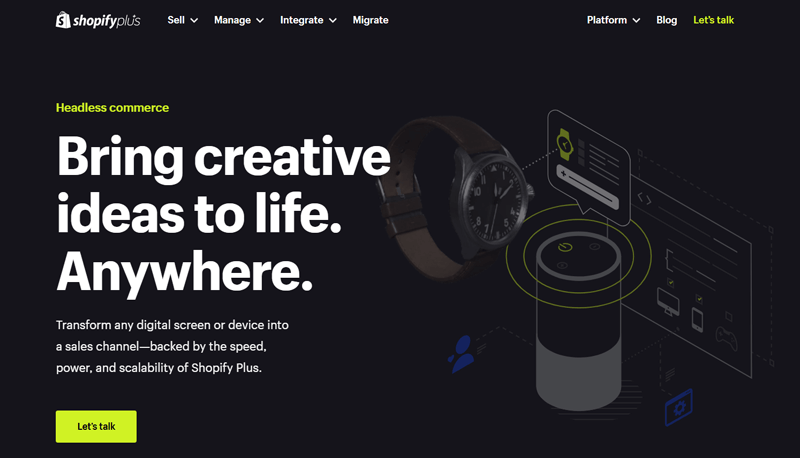
Further, it can quickly convert any digital screen into a sales channel with its built-in headless commerce tools. And you can manage your products on all the channels from a single back-end.
Moreover, it gives you full control to provide a better buyer and developer experience. Some of its notable features are discounts, carts, meta fields, customer accounts, and more.
Pros:
- Includes built-in tools and integrations of 1500+ applications and extensions. Also, you can include systems like ERP (Enterprise Resource Planning), CRM, etc.
- You can add video and 3D images on the product pages.
- GraphQL Storefront API quickly designs and engages storefronts on the web and mobile.
- Perform front-end customization with an intuitive editor or directly change the codes.
- Able to add custom URL links to your products for more visibility on search engines.
- Contains multiple security features like bot protection, fraud & risk analysis, and more.
Cons:
- Shopify Payments aren’t available in every country.
- High cost and may charge you an extra transaction fee.
- As a hosted platform, you’ll not get access to FTP or the database.
- The headless eCommerce approach leads to the loss of integration of some Shopify apps.
Pricing:
Shopify Plus is a premium platform so you’ll have to pay $2000/mo. If you need more features for your large business, then you can go with a custom plan with a variable fee.
Are you looking for competitors of the Shopify eCommerce platform? Then, here are the best Shopify competitors and alternatives to try out.
2. BigCommerce
BigCommerce is one of the best headless eCommerce platforms to create unique customer experiences in your online shop. You can select a suitable front-end framework for your website. Some of the choices it offers are Next.js, Gatsby.js, and Nuxt.js.
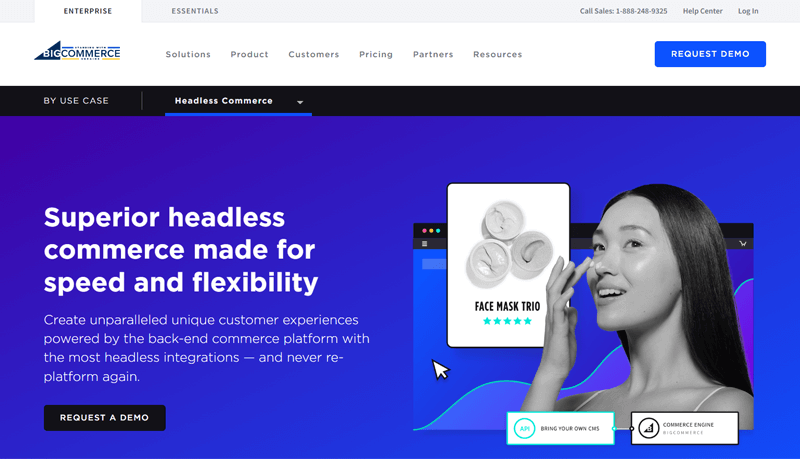
In addition, it allows you to select your ideal CMS (Content Management System) to build the site. Also, it’s well-integrated with other headless platforms. Such as WordPress, Contentful, Prismic, or Contentstack.
Pros:
- Offers top digital experience platforms to use. Such as Uniform, Amplience, Bloomreach, Shogun Frontend, etc.
- Comes with REST and GraphQL API endpoints to build unique storefronts.
- Developers can collaborate with business users to manage the storefronts from a control panel.
- Able to handle up to 600 SKUs (Stock Keeping Unit) per product.
- You can connect all the storefronts on various channels and regions on one single account.
- Works perfectly fine on traffic spikes with 99.99% average uptime service.
Cons:
- Not the best in terms of customization. Since it lacks features like product sorting.
- Improvement can be done on the backend interface of the platform.
- Complex data import/export function.
Pricing:
Headless eCommerce is a BigCommerce Enterprise solution. You’ll not find the price options on its website. As a premium platform, you can request the team to provide you with the pricing options. Once you send the form filling your business needs, you’ll get the info accordingly.
Do you want to know the differences between Shopify and BigCommerce? Then, here’s an article on Shopify vs BigCommerce to know which is a better eCommerce platform.
3. Adobe Commerce
Adobe Commerce is a powerful platform that makes multi-channel commerce experiences for B2B (Business-to-Business) and B2C (Business-to-Customers). Moreover, this solution is suitable for any small to enterprise-level business for building and managing multiple eCommerce sites.
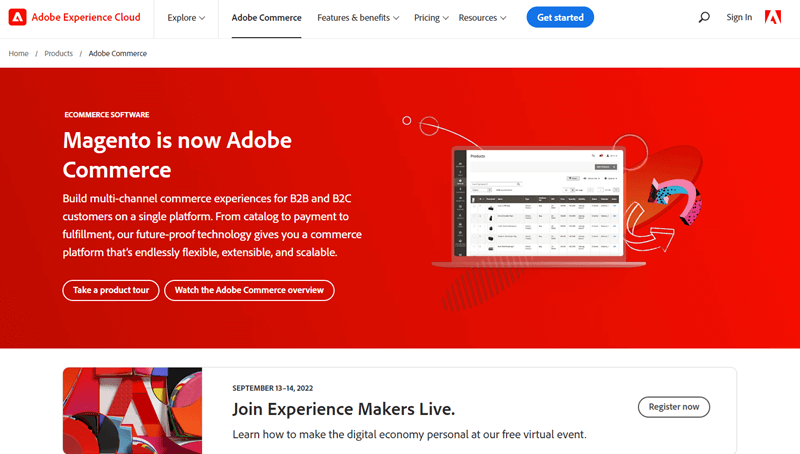
Additionally, it’s built on a cloud-based headless architecture that’s fully scalable and extensible. This means you can integrate any new technology to reach more customers.
Pros:
- You can add new brands or product catalogs. Also, deploy multi-tenant or multi-region storefronts from a single platform.
- Includes a large collection of self-contained module features and extensions marketplace.
- PWA (Progressive Web Application) Studio technology has app-like shopping experiences on mobile and desktop devices.
- Adobe Experience Manager helps you personalize the shopping experience and create targeted promotions.
- Offers you a fully customizable dashboard to store and monitor your business data.
- Comes with advanced reporting options like automating report updates, exporting data, etc.
Cons:
- Price totally depends on the resources you’ll use on your platform. So, it’s quite tricky.
- Not the best in terms of performance.
- A slight learning curve makes it overwhelming for beginners.
Pricing:
The price of Adobe Commerce (also called Magento) depends on the resources you’ll be using on your eCommerce site. The estimated value of this premium platform is more than $22,000/year.
However, the software is open-software and completely free. This makes its pricing quite tricky. To know the cost of using this platform for your site, you can fill up the form to request a demo.
4. commercetools
commercetools is one of the world’s leading eCommerce platforms with the next-generation headless solution. This platform utilizes machine learning technology. Now, you can easily provide product recommendations, personalized promotions, and on-demand offers.
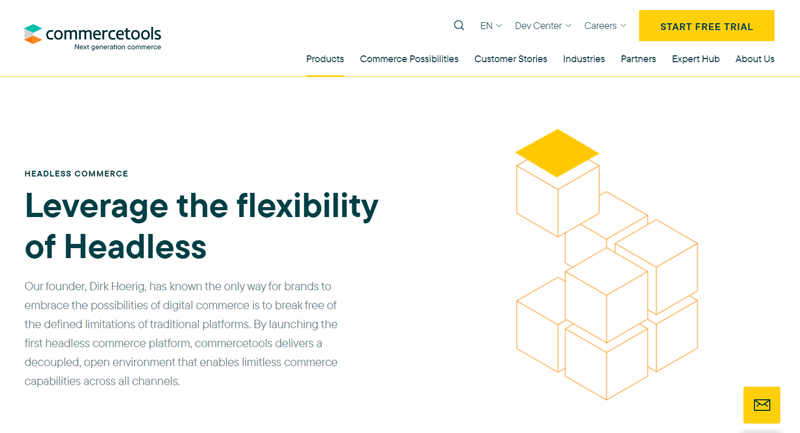
In addition, every feature and function in commercetools is easily available with its APIs. Thus, you can connect it with your business ecosystem or any other software your business relies on.
Pros:
- This headless platform automatically scales, adapts, and grows along with your business.
- Automatically performs platform maintenance. It means changes, addition, and upgrades won’t have an impact on response times or customer experience.
- Makes any device or channel shoppable. Also, you’ll get features like mobile apps, chatbots, IoT (Internet of Things), or any new technology.
- Uses GraphQL so that you’ll retrieve only the data you asked for. This helps you improve your overall performance.
- Includes features like testing use cases and tailoring the functionality to meet your needs.
- Comes with powerful search functions. Such as multiple filters, image search, etc.
Cons:
- Price may differ based on your customer/SKU combination.
- It can improve further integrations to other third-party platforms.
- Doesn’t include a geographic variation option for the product portfolio.
- The lack of advanced data mapping functions results in poor integration with ERPs.
Pricing:
You can start using this premium commercetools platform with its 60-day free trial (no credit card information). Moreover, you’ll get access to all the business tools and API catalogs.
Thus, all you need to do is fill up a form about your business. Once your trial completes, you can decide to continue the service. Then, you’ll know the price option by contacting its team. But the estimated price of this platform is $2500/mo.
5. Salesforce Commerce Cloud
Do you want to set up an eCommerce site based on your customer data? Then, select Salesforce Commerce Cloud.
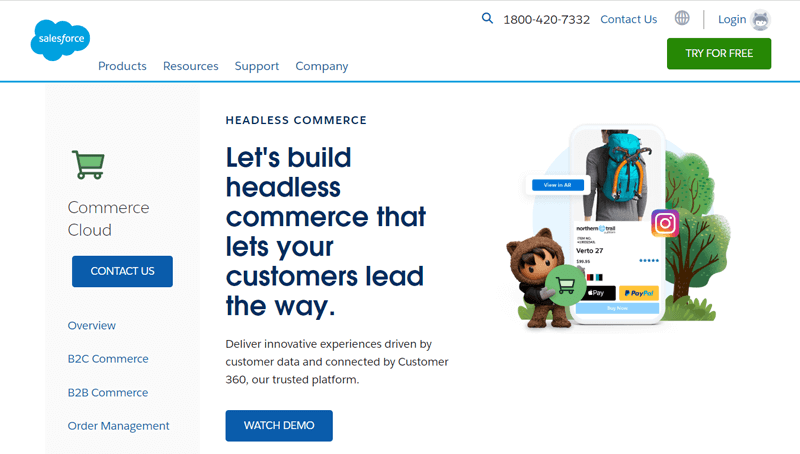
This platform connects your customer data across various marketing, sales, and service tools on the Salesforce Customer 360 platform. As a result, you can deliver innovative customer experiences.
On top of that, you can use multiple developer toolkits and templates. Using them, you can build each aspect of the user experience on mobile apps or digital storefronts.
Pros:
- Progressive Web App (PWA) kit can easily launch React-based mobile-first storefronts that match your brand.
- The Commerce Managed Runtime function can auto-scale your website even in high traffic.
- Comes with a headless CDN (Content Delivery Network), WAF (Web Application Firewall), and security monitoring features for uptime service.
- Launch numerous headless promotions and activate inventory from SKUs of many stores.
- You can test and introduce customer experience changes more quickly and frequently.
Cons:
- Focused on enterprise-level businesses.
- Salesforce runs on its ecosystem. This means you have to use its apps and services.
- Not that great in customer support.
Pricing:
The premium Salesforce Commerce Cloud platform divides its prices into 2 categories. They are B2C Commerce and Order Management. And each of them has some price options. Let’s see them.
1. Salesforce B2C Commerce
- Starter: 1% growth merchandise value, billed annually, usable for 1 website, and more.
- Growth: 2% growth merchandise value, billed annually, 5 sites applicable, etc.
- Plus: 3% growth merchandise value, billed annually, unlimited site usage, and others.
2. Order Management
- Starter: $0.3/order, billed annually, and able to sell on 20 different channels or locations.
- Growth: $0.5/order, billed annually, and able to sell on 500 different channels or locations.
6. Arcadier
Are you looking for a headless eCommerce platform to make an online marketplace? Then, you can go with Arcadier, a powerful SaaS (Software as a Service) platform.
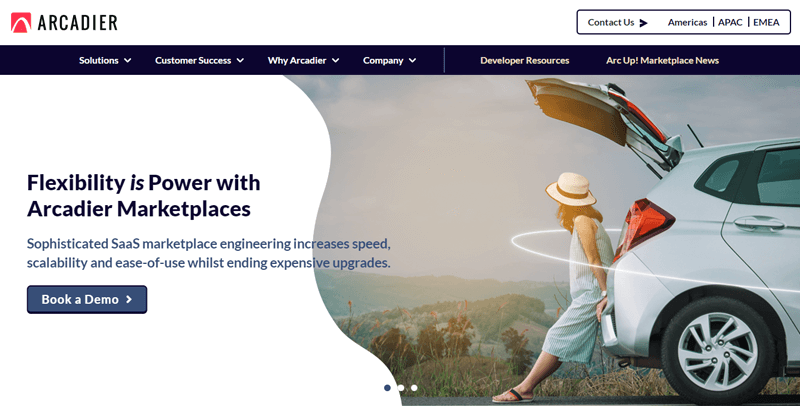
With its headless solution, you can design and build the frontend design yourself while utilizing Arcadier’s backend marketplace. Moreover, you can also select a starting point as per your design preference to easily get started.
Along with that, you’ll get to add unique features of your own to boost your brand needs. For that, this solution seamlessly integrates with existing systems and other 3rd party applications. Ultimately, this improves the user experience of your marketplace.
Pros:
- With its API-led structure, you can develop, test, and iterate the functions easily.
- Includes built-in security features. Plus, you can add additional layers of security for the backend and frontend separately.
- Well documented for you to know what exactly can be possible using APIs in Arcadier.
- Offers managed services like customization and support to help you meet your expectations.
- The migration support team helps migrate your marketplace to this platform.
Cons:
- The starting plans don’t have many customization features.
- Not the easiest when making customizations in the larger plans.
- Best if users could enable/disable the features that it offers.
Pricing:
Arcadier is also a premium platform. It lets you contact the team by filling up a form stating your basic contact information. With that, you can know the cost of the headless solution for your business. As per the estimation, this platform costs you about $1200/mo.
7. Elastic Path Commerce Cloud
Elastic Path Commerce Cloud is an all-in-one eCommerce platform with headless technology. You can launch and optimize all your product lines, business models, geographies, channels, and brands centrally. Further, it comes with a catalog composer to create unique catalogs in minutes.
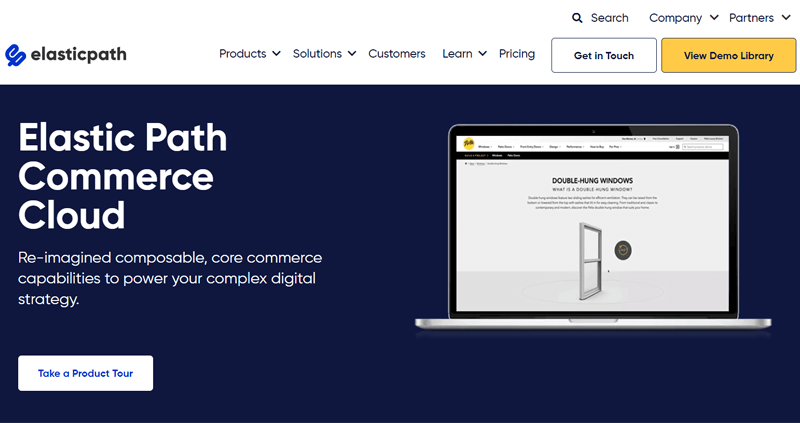
Plus, you get to manage and personalize the entire shopper experience. Like adding content-rich pages, AI-powered search, promotion options, attractive cart/checkout pages, etc. As a result, you can easily gain the trust of your customers.
Pros:
- Gives lightning-fast user experience and 99.99% uptime service for high availability.
- Commerce PIM (Product Information Management) system gives flexible data management features for your every merchandising strategy.
- Price books allow you to manage your store pricing strategies by account, user, or product.
- Able to integrate any payment gateway of your choice like Stripe.
- Easily review, manage, and update orders and inventory of multiple channels.
- Includes customers and account management options for any B2B or B2C eCommerce.
Cons:
- May take longer to customize some business solutions.
- The product management tool isn’t available for use over the web.
- It has a slight learning curve for first-time users due to a lack of proper documentation.
Pricing:
The price of this premium headless eCommerce platform depends on 3 things:
- Elastic Path software subscription cost
- Third-party software subscription
- Implementation cost
First, you can view the demo library of this solution and then contact its team to determine the purchase cost. Usually, it costs about $2500/mo if we have to estimate.
8. Fabric
Fabric is yet another one of the most modern headless eCommerce platforms for the best customer experiences. It lets you connect all the products, pricing, and order information across channels. Also, you can manage them with its fabric PIM, like updating the content from one place.
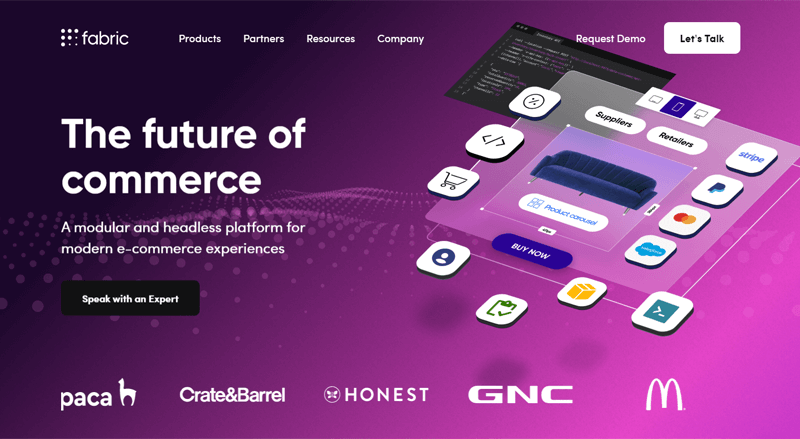
Besides, it’s also a flexible platform that lets you select any technology. For that, you can connect your Fabric with any third-party or in-built technology.
Pros:
- Able to analyze the orders with reports using the Fabric OMS (Order Management System).
- Fabric XM makes it easy to optimize your content, campaigns, and shopping experiences.
- Ability to make experience components for business users to work on your eCommerce site.
- Contains 300+ commerce APIs that help developers to extend the functions of the front end.
- You can make a full-fledged marketplace with features for vendors and retailers.
- Assign flexible pricing and promotional offers on products for more conversion rate.
Cons:
- It can improve its reporting capabilities more.
- Ideal for fast-growing enterprises only.
- Doesn’t work best for mobile applications.
- Relatively, expensive.
Pricing:
Similar to most headless eCommerce platforms, Fabric is also a premium platform. So, to know about its price option, you need to request a demo first. For reference, its price is estimated to be around $6000/mo.
9. OroCommerce
An enterprise-grade B2B eCommerce platform with secure and scalable features is OroCommerce. This platform supports headless, traditional, or any other eCommerce deployment model you want. Moreover, it offers lots of tools for sales, marketing, IT, and eCommerce tools to work effectively.
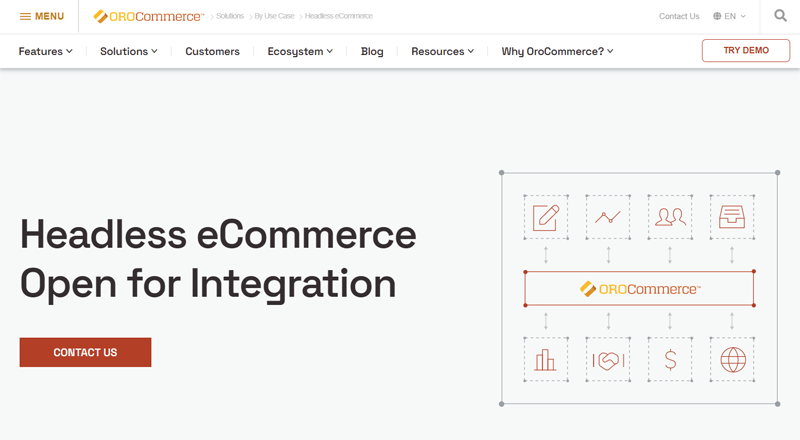
Furthermore, its headless commerce solution comes with multiple touchpoints (areas to improve for marketing). Other than that, it helps you make progressive web apps, voice-activated assistants, and other newer technologies.
Pros:
- Includes customizable workflows, reporting, access controls, permission configuration, and more features.
- Able to manage unlimited storefronts in multiple channels from a single backend.
- For your eCommerce design, you can integrate ERPs, PIMs, and other business solutions.
- An open-source platform that allows you to add flexible and modular products to the store.
- Contains SEO (Search Engine Optimization) features like meta-titles, meta-keywords, etc.
- Comes with a built-in email engine to send emails to customers/buyers right from the store.
Cons:
- Best for people with experience in coding.
- Contains more built-in functions rather than integration to extensions or 3rd party apps.
Pricing:
The core OroCommerce platform is free. But the Enterprise edition is premium with the headless commerce feature, so you need to contact its team. It usually costs about $3700/mo. Also, it comes with a custom plan option to meet your requirements.
10. Nacelle
Nacelle is a growing headless eCommerce platform ideal for merchants, developers, and agencies. With this platform, businesses can improve the overall performance of their websites. Whether it’s by boosting the speed, reducing the cost of ownership, or minimizing time consumption.
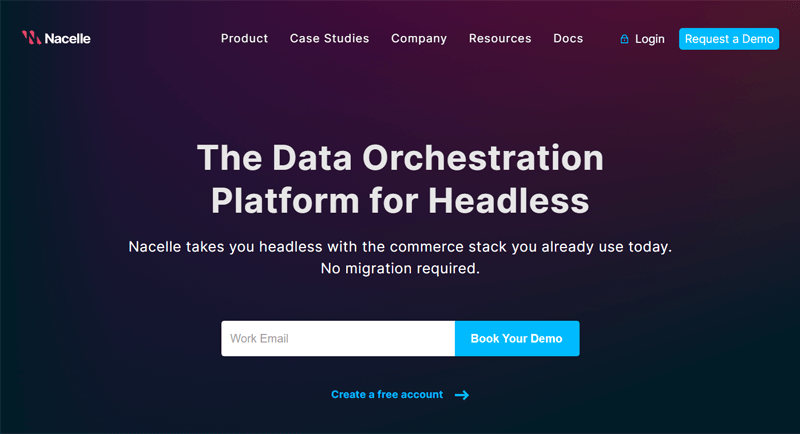
Moreover, it’s designed to help Shopify users easily start their selling business. Further, Nacelle comes with the power of Shopify Plus headless commerce. It means you won’t have to change or update the components of your application when switching between these platforms.
Pros:
- The GraphQL layer allows you to access the index, real-time inventory updates, and unlimited API calls.
- Its data orchestration engine helps you maintain data consistency and quality.
- Includes developer-friendly features like Git deployment, staging servers, unit testing, etc.
- You can choose and use the tools of your choice on your site.
- Easily connects to most of the OMS, PIM, and commerce systems using the APIs.
- Able to combine this headless eCommerce platform with other CMS platforms. Such as Sanity and Contentful.
Cons:
- Comparatively, it has a steep learning curve.
- It’s one of the new platforms, so it’s not well-known among developers and merchants.
Pricing:
Do you want to get this premium platform for your eCommerce site with headless capabilities? Then, you must first request its team. After that, you can contact them to know its purchase process and price.
11. Spryker
Spryker is one of the top eCommerce platforms with multiple technologies, including the growing headless eCommerce capabilities. It includes its Glue API that can integrate your store with smart devices and systems like CMS platforms. This meets the needs of any B2C or B2B business.
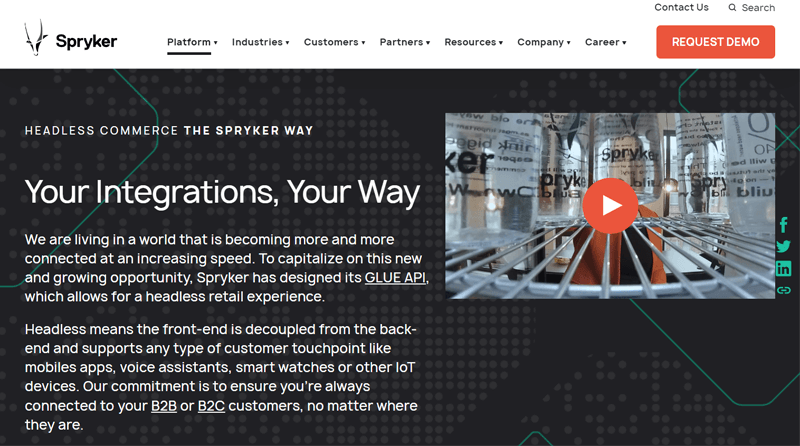
In addition, it comes with Link Middleware that adapts your existing solution and makes Spryker work within your technology stack. This means you don’t need to alter your system to work with this platform. Ultimately, this makes it one of the most adaptable headless eCommerce platforms.
Pros:
- Using the voice assistant function improves the customer experience in online shops.
- You can use smart shelves made up of sensor technology. This makes detecting the addition and removal of products on your inventory easy.
- Electronic Shelf Labels (ESF) help you locate product items digitally.
- Includes a high level of modularity resulting in the security and maintenance of websites.
- Comes with exclusive features like search, filters, product offers, and more.
- Easily build, test, and deploy storefronts and their frontends.
Cons:
- It has a small community of active users compared to other platforms.
- Lack of proper support and documentation may lead to a steep learning curve.
Pricing:
Similar to Nacelle, Spryker is also a premium platform. And that you need to request its team to clarify its pricing options.
12. Stapi.io Enterprise
Stapi.io Enterprise is an enterprise-ready headless CMS to build any kind of site of any size. That includes creating eCommerce sites. Plus, it’s ideal for businesses as it can speed up both software and content delivery. And that’s because of its ability to make an omnichannel digital experience.
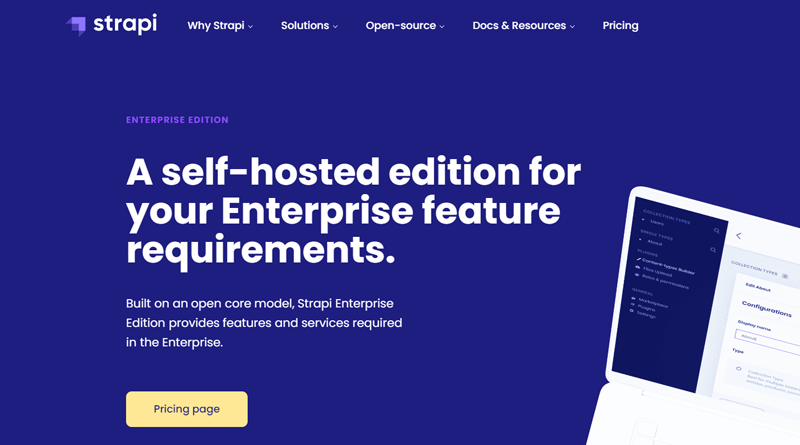
Not to mention, it comes with a simple yet intuitive user interface. For customization, you just need to make changes to the API or your data structure in the code editor. Along with that, it also comes with lots of fields to use for your website.
Pros:
- Secure your endpoints by allowing or denying users to get access to your API by roles.
- Includes built-in sorting and filtering options to ease users to manage entries on your store.
- Contains an SEO-optimized media library to add captions, custom filenames, and more.
- Consists of a built-in emailing system. Because an SMTP server is installed on each project.
- Supports integration to tools like SendGrid, Mailgun, Stripe, PayPal, and more.
- Ability to make different versions of your platform for different countries. Then localize the content with translation to select what pages to show.
Cons:
- It can improve customer support options like detailed documentation, tutorial videos, etc.
- Comes with frequent updates, making the test of those updates on the site difficult.
Pricing:
Strapi.io Enterprise has a community plan which is forever free. It comes with up to 3 default roles, REST and GraphQL API, unlimited customization abilities, and more.
Furthermore, the following are the premium price options present in this self-hosted platform:
- Bronze Plan: $9/admin user/month, granular access controls, etc.
- Silver Plan: $29/admin user/month, all Bronze features, and customer success manager.
- Gold Plan: For technical support with SLAs and onboarding, select this custom plan.
13. nopCommerce
Lastly, nopCommerce is one of the ideal headless eCommerce platforms for developers. It allows you to manage the logic and function layers of the eCommerce site. Also, you can choose any front-end technology for a better-customized user experience for selling business online.
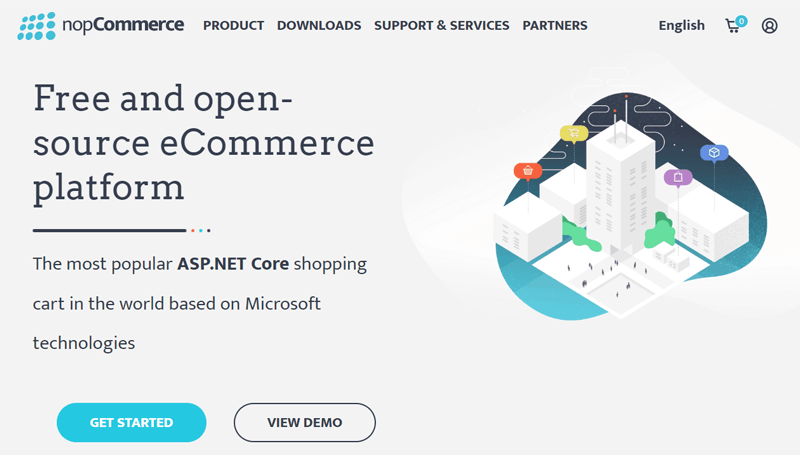
On top of that, this platform comes with its Web API plugin. Using this plugin, developers can use any CMS, ERP, PIM, or mobile app for their online store.
To add more, it supports a mobile version of the site with visually appealing features. Thus, it’s mobile commerce software that works on any connected device. And you’ll not need any add-ons.
Pros:
- Includes important shopping features like fraud protection, inventory management, payment and checkout processing, etc.
- Also, it contains advanced features for enterprises. Such as multi-vendor, marketing tools, tax services, multi-currency support, and more.
- Works well for any start-up to multi-product marketplace website to gain business goals.
- It has SEO features like sitemap, breadcrumbs, Google Analytics integration, and more.
- Contains built-in business reporting and analytics, business intelligence systems, etc.
Cons:
- Requires software development skills for upgrading the platform.
- Comes with basic features for content pages on websites.
Pricing:
nopCommerce is a paid platform for headless eCommerce capabilities. Usually, it costs you about $850/year to use on building online store websites.
Do you want to learn to create a website from scratch? Then, make sure to read our step-by-step guide on how to create a website!
Conclusion
And that’s a wrap! We’re at the end of this list of the best headless eCommerce platforms. So, we hope you agree to our list and can find a suitable solution for your website.
If you want us to recommend a platform, then we’ll go with Shopify Plus. It’s one of the most popular and powerful eCommerce platforms suitable for today’s growing shopping businesses. Moreover, it has a clear pricing option that others may not.
However, using any one of them is ideal for your growing website. So, in case you’re in any confusion, then make sure to post a comment. We’ll try to get back to you real quick.
Further, we want you to read our helpful blogs. That includes our articles on the best eCommerce plugins for WordPress and the best multivendor eCommerce platforms for marketplaces.
Lastly, follow us on Twitter and Facebook. And make sure to share our articles if you like them.
